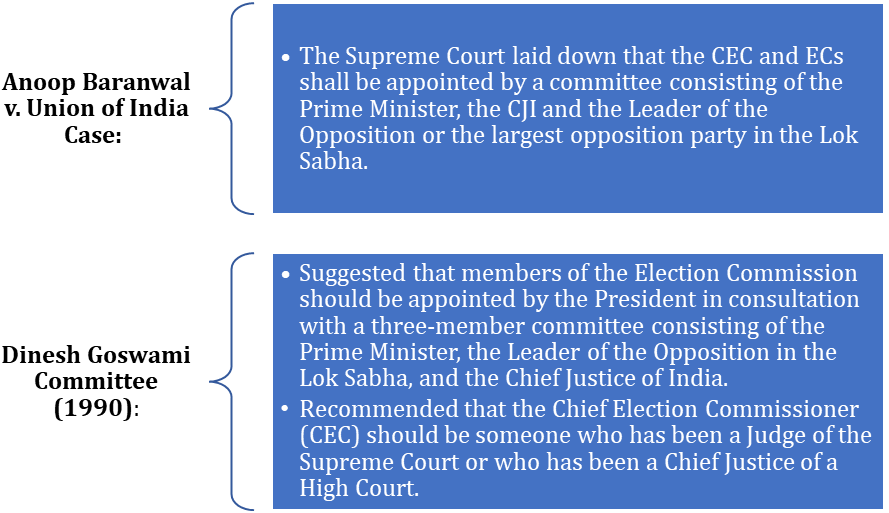The Chief Election Commissioner and Other Election Commissioners (Appointment, Conditions of Service and Term of Office) Bill, 2023
2023 DEC 25
Mains >
Constitution > Indian Constitution > Constitutional Bodies
Syllabus
GS 2 > Indian Constitution > Constitutional Bodies
REFERENCE NEWS
Recently, the Chief Election Commissioner and Other Election Commissioners (Appointment, Conditions of Service and Term of Office) Bill, 2023, was passed by both Lok Sabha and Rajya Sabha.
KEY FEATURES OF THE BILL
- Election Commission: The Election Commission will consist of a Chief Election Commissioner (CEC) and other Election Commissioners (ECs). The President will periodically fix the number of ECs.
- Appointment of the Commission: The Commission will be appointed by the President, upon the recommendation of the Selection Committee. The Selection Committee will comprise the Prime Minister, Cabinet Minister, and Leader of Opposition in Lok Sabha (or leader of the single largest opposition party). A Search Committee headed by the Cabinet Secretary will suggest five names to the Selection Committee. The Selection Committee may consider any person other than those suggested by the Search Committe.
- Eligibility criteria: The CEC and ECs must: (i) be persons of integrity, (ii) have knowledge and experience in the management and conduct of elections, and (iii) be or have been Secretary (or equivalent) to the government.
- Term and reappointment: Members of the Election Commission will hold office for six years, or until they attain the age of 65 years, whichever is earlier. Members of the Commission cannot be re-appointed. If an EC is appointed as a CEC, the overall period of the term may not be more than six years.
- Salary and pension: The salary, allowances, and other conditions of service of the CEC and ECs will be equivalent to that of the Cabinet Secretary. They will have an option to draw pension and other retirement benefits from the service that they belonged to previously.
- Removal: The Bill retains the manner of removal of CEC and ECs as specified in the Constitution. The CEC may be removed in the same manner and on the same grounds as a Supreme Court Judge. ECs may be removed only upon the recommendation of the CEC.
SIGNIFICANCE OF THE BILL
- Transparent Appointment Process: The formal committee structure is aimed at making the appointment process for the CEC and ECs more transparent and less prone to biases or undue influences.
- Inclusive Eligibility Criteria: By emphasizing qualifications like integrity and extensive experience in managing elections, the bill seeks to ensure that only individuals with a strong track record and ethical standing are appointed.
- Defined Service Term: Setting a clear term limit for service is intended to foster greater accountability among officials and prevent any concentration of power due to extended tenures.
- Legal Protection: Providing immunity from legal actions in relation to official duties is designed to support unbiased and fearless decision-making by protecting officials from potential legal repercussions.
- Compensation Parity: Aligning the remuneration of the CEC and ECs with that of the Cabinet Secretary is intended to ensure fairness and consistency in compensation among top government roles
CHALLENGES:
- Potential Compromise on ECI's Independence: The selection committee's majority composition of government representatives could raise concerns about the potential influence on the Election Commission's independence.
- Risk of Executive Overreach on Salaries: Linking the salaries of the CEC and ECs to the Cabinet Secretary might allow for executive influence over their compensation, potentially impacting the independence of these roles.
- Exclusion of Broader Talent Pool: The restriction of eligibility to high-ranking bureaucrats could potentially exclude other professionals who may be equally or more qualified for these positions.
- Asymmetry in Removal Process: The different procedures for removing the CEC and ECs could create imbalances within the Election Commission, affecting its functionality and internal dynamics.
- Undermining the Search Committee's Role: The ability of the Selection Committee to bypass the Search Committee's recommendations might undermine the latter's role and purpose, raising questions about the effectiveness of this preliminary screening process.

WAY FORWARD
- Enhanced Selection Committee Diversity: Include non-political figures, such as retired judges or eminent persons, to reduce potential political bias in the selection process.
- Broader Eligibility Criteria: Expand the eligibility to include experts in law, public administration, or civil society leaders to tap into a wider talent pool.
- Transparent Salary Structure: Implement a salary structure that is independent of executive influence, perhaps through a parliamentary committee, to safeguard the financial autonomy of the CEC and ECs.
- Harmonized Removal Process: Consider a uniform removal process for both the CEC and ECs to maintain internal balance and protect against arbitrary removal.
- Empowering the Search Committee: Strengthen the role of the Search Committee by making its recommendations more binding, ensuring that the selection is based on merit and expertise.
To enhance the effectiveness and independence of the Election Commission of India, introducing robust checks and balances are essential. This approach will foster greater trust in the electoral process and uphold democratic principles.
PRACTICE QUESTION
Q: Critically analyze the Chief Election Commissioner and Other Election Commissioners (Appointment, Conditions of Service and Term of Office) Bill, 2023.(10M, 15OW)
